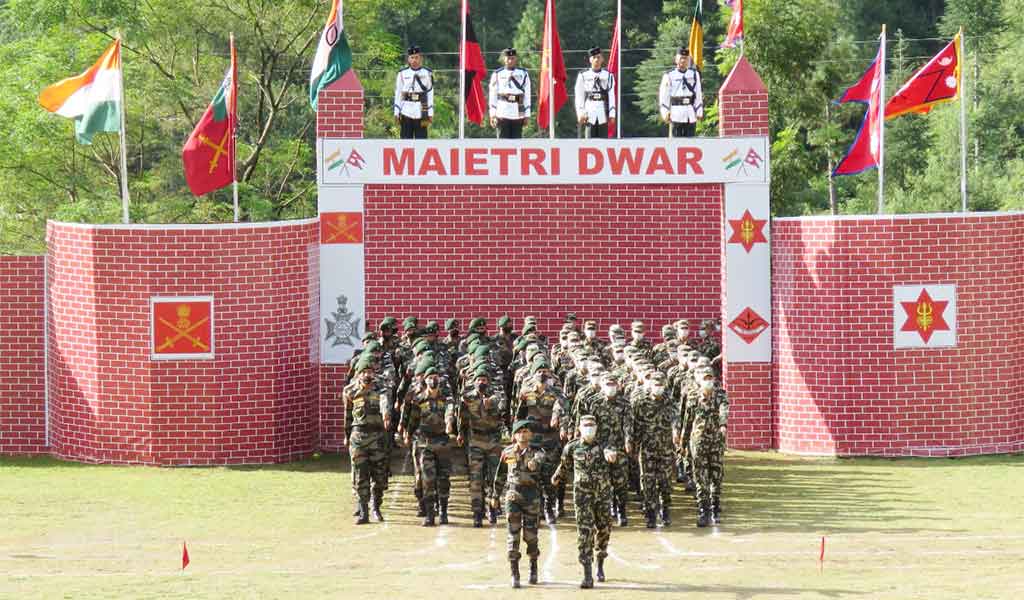Opinion: Strengthening Indo-Nepal defence ties with Surya Kiran
For India to preserve its influence in Nepal and guarantee regional stability, defence cooperation, including drills like Surya Kiran, is essential

By Sofia Eve Mathew, Dr Karamala Areesh Kumar, Dakka Surya Teja
With a focus on fortifying military connections between the two adjacent nations, Exercise Surya Kiran 2024-25 was a striking example of the continuous improvement of defence cooperation between India and Nepal. This joint military exercise, in Saljhandi, Nepal, from December 29, 2024, to January 13, 2025, showcased the long-standing military, cultural and geopolitical ties between the two nations.
Also Read
- Indian Army team heads to Jakarta for Garud Shakti 24 exercise
- India to participate in ‘Nomadic Elephant-2023’ joint military exercise in Mongolia
- Indian, US armies hold joint exercises in Alaskan snow-bound mountain
- Indian contingent departs for India-Kazakhstan joint military exercise ‘KAZIND-2023’
Enhancing interoperability between Indian and Nepalese armies is the main objective of the exercise, which concentrates on counterterrorism in mountainous areas, jungle warfare, and Humanitarian Assistance and Disaster Relief (HADR) by the UN Charter. The broader geopolitical and security dynamics that influence Indo-Nepal relations are reflected in the exercise’s significance, which goes beyond its operational goals.
Military Ties
Following the signing of the Treaty of Peace and Friendship, which established the framework for defence cooperation, India and Nepal began collaborating militarily in the early 1950s. The creation of the Gurkha regiments, known for their valour and fighting prowess, is an example of how this treaty permitted Nepalese soldiers to serve in the Indian Army.
The defence alliance has grown to include cooperative counter-insurgency operations, intelligence sharing and joint training exercises. Surya Kiran is an exercise that started in the early 2000s and is still a vital forum for improving military cooperation.
Strengthening their defence connections has become a shared goal as both countries deal with security issues in the region, especially in light of China’s growing influence and the Himalayan region’s strategic location. The Surya Kiran exercise is vital for developing the capacity for cooperative activities in such rugged terrains.
Relevance of Exercise
According to the Additional Directorate General of Public Information (ADGPI), soldiers from India and Nepal share best practices, enhance interoperability and fortify their ties during the exercise. But the exercise’s importance extends beyond the tactical realm. It is a key component of India’s larger plan to strengthen defence ties with Nepal, advance regional stability and highlight the two nations’ longstanding cultural and historical ties.
With Nepal leaning towards China, the military cooperation highlights the strategic importance of Indo-Nepal relationships
Improving coordination in counterterrorism and jungle warfare operations in hilly regions is one of the exercise’s primary goals. This is particularly crucial in light of the common security issues that both nations deal with due to their closeness to China and the unstable Himalayan region. Both forces greatly benefit from cooperative operations in such a complicated setting.
The focus on HADR operations also emphasises the mutual dedication to regional stability and peace. India’s experience in disaster management is beneficial to Nepal, which is regularly hit by natural disasters like earthquakes and floods. The two countries’ cooperation in responding to similar emergencies demonstrates the trust and cooperation between their military.
Visit of General Sigdel
A significant turning point in strengthening defence and strategic cooperation between the two nations was reached when General Ashok Raj Sigdel, the Chief of the Nepali Army, travelled to India from December 11 to 14, 2024. During his visit, General Sigdel and his Indian counterpart, General Upendra Dwivedi, discussed improving operational and technology capabilities, facilitating joint exercises like Surya Kiran and increasing military collaboration.
Agreements to improve the Nepalese Army’s operational readiness were among the visit’s main results; India agreed to provide medical supplies for field hospitals and a target practice drone. These changes show that modernising Nepal’s military capabilities and incorporating new technologies into defence operations are becoming increasingly important. The fact that General Sigdel was granted the Honorary Generalship of the Indian Army indicates the great regard and confidence the armed forces of both countries have for one another.
Geopolitical Dimensions
Even though India and Nepal have a long history of military cooperation and similar security concerns, recent geopolitical events have complicated the relationship. India is concerned that Nepal’s increasing economic reliance on China, mainly through the Belt and Road Initiative (BRI), may cause it to turn away from India. Tensions have arisen due to China’s increasing influence in Nepal, mainly because India sees Nepal as a strategic barrier between China and itself.
Despite these obstacles, India nonetheless prioritises its connection with Nepal, militarily and through infrastructure development, financial assistance and cultural exchange. India is still Nepal’s biggest trading partner and plays a vital role in the country’s development. For India to preserve its influence in Nepal and guarantee regional stability, defence cooperation — including drills like Surya Kiran — is essential.
Beyond Military
Exercise Surya Kiran represents the close and complex relationship between India and Nepal and is more than just a military exercise. The two nations are fortifying their defence capabilities and strengthening their relationship through cooperation, joint training and a dedication to regional peace.
Even if there are still difficulties, especially given Nepal’s expanding contacts with China, the military cooperation demonstrated by Exercise Surya Kiran highlights the strategic significance of Indo-Nepal relationships. The exercise strengthens the commitment to regional stability, mutual security and trust while improving both armies’ operational effectiveness.
As the exercise progresses, developing Indo-Nepal military relations will be crucial, guaranteeing that both nations are ready to meet the changing South Asian security environment.

(Sofia Eve Mathew is a student and Dr Karamala Areesh Kumar is Head, Department of International Relations, Peace and Public Policy, St Joseph’s University, Bengaluru. Dakka Surya Teja is a PhD scholar at Jawaharlal Nehru University [JNU], New Delhi)
Related News
-
Iran warns of ‘decisive’ response if subjected to military aggression
4 mins ago -
US study finds direct link between air pollution and Alzheimer’s disease risk
11 mins ago -
Terror plot foiled in Arunachal’s Longding; NSCN-IM militant arrested, arms recovered
14 mins ago -
Tharoor breaks ranks, backs India’s AI summit as PM Modi charts global push
23 mins ago -
Surgical instrument found in woman’s abdomen 5 years after surgery in Kerala
35 mins ago -
Ranveer Singh threat case: Lawrence Bishnoi gang demands Rs 10 crore
44 mins ago -
Stock markets bounce back after falling in early trade
45 mins ago -
Yash unveils bold new avatar in Toxic: A Fairytale for Grown-Ups
56 mins ago




